Search the Special Collections and Archives Portal
Search Results

Transcript of interview with Ed Collins by Steve Smith, March 15, 1981.
Date
Archival Collection
Description
Text
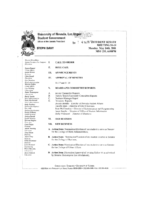
Meeting minutes for Consolidated Student Senate, University of Nevada, Las Vegas, May 14, 2001
Date
Archival Collection
Description
Text
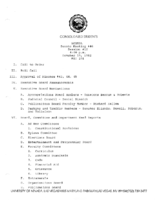
Meeting minutes for Consolidated Student Senate, University of Nevada, Las Vegas, October 19, 1982
Date
Archival Collection
Description
Text
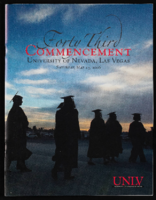
University of Nevada, Las Vegas (UNLV) 43rd commencement program
Date
Archival Collection
Description
Commencement program from University of Nevada, Las Vegas Commencement Programs and Graduation Lists (UA-00115).
Text
Charles Quander oral history interview
Identifier
Abstract
Oral history interview with Charles Quander conducted by Claytee D. White on October 27, 2005 for the African Americans in Las Vegas: a Collaborative Oral History Project. Quander, who served as a flight officer in the Army Air Corps first all-Black fighter and bomber squadrons known collectively as the Tuskegee Airmen, talks about his upbringing in Washington, D.C., his early interest in flight, and his decision to train as a pilot at the outset of World War II. Quander talks about his training and reflects on both the process of learning to fly and the discrimination that the cadets experienced from the predominately white senior officers. He then talks about his post-military education and his career with the federal government, working as an investigator for the Bureau of Alcohol, Tobacco, and Firearms (ATF) and the United States Attorney's strike force on organized crime. He ends the interview describing his retirement and travel, his move to Las Vegas, Nevada, and his views on war, the Department of Homeland Security, and his perceptions of Las Vegas' growth.
Archival Collection
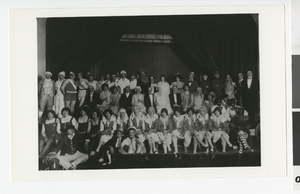
Photograph of Kiwanis Follies, Las Vegas (Nev.), April 30-May 1, 1928
Date
Archival Collection
Description
Image

Transcript of interview with Cecile Dotson Crowe by Darin Toldisky, April 27, 1981
Date
Archival Collection
Description
On April 27, 1981, Darin Toldisky interviewed Cecile Dotson Crowe (born October 17th, 1911, in Millville, Utah) at Clark County Library in Las Vegas, Nevada. This interview covers Mrs. Crowe’s account of the building of Hoover (Boulder Dam). Mrs. Crowe discusses the Six Companies, Boulder City, and recalls President Franklin Delano Roosevelt’s visit to Nevada by train to dedicate the dam on the 30th of September, 1937.
Text

Transcript of interview with Harvey Diederich by K.J. Evans, January 4, 1999
Date
Archival Collection
Description
Text
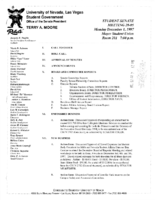
Meeting minutes for Consolidated Student Senate University of Nevada, Las Vegas, December 1, 1997
Date
Archival Collection
Description
Text
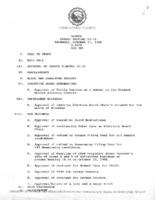
Meeting minutes for Consolidated Student Senate University of Nevada, Las Vegas, October 27, 1988
Date
Archival Collection
Description
Text
